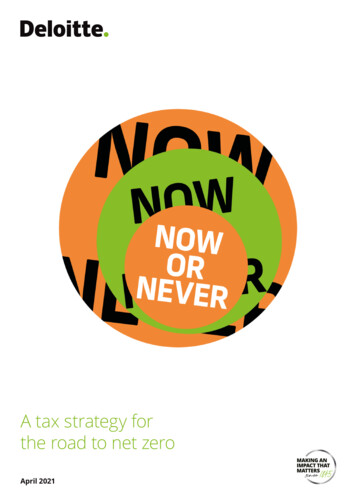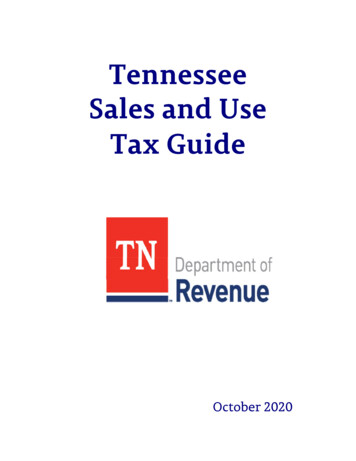
Transcription
A tax strategy forthe road to net zeroApril 2021
A tax strategy for the road to net zeroA tax strategy for the road to net zeroThe road to net zeroClimate change is the defining issue ofour time.Government policies, customer, employeeand consumer demands, investor pressureand technology are all converging to drivedecarbonisation.Against this backdrop, the role of business isshifting, as society is increasingly demandingthat business acts as a force for good.Corporates will play a key role in respondingto climate change. Numerous organisationshave made public commitments to reducegreenhouse gas emissions.Progress towards these goals needs aplan. The way any company acts today inresponse to climate change will almostcertainly impact its degree of advantagetomorrow.Why does this matter forthe tax team?Organisations are increasingly focusingon purpose, with ever greater focus onEnvironmental, Social and Governance (ESG)principles. This places climate response andthe road to net zero at the core of businessstrategy, and tax leaders need to considerhow their tax teams can contribute positivelyto these changing business priorities andwider social purpose.For many organisations, climatechange will have a profound impacton business operations. As with anybusiness transformation, there will be taxconsequences as a result of business modeland supply chain change.Many of the policy levers used bygovernments on the road to net zero will bein the tax sphere, ranging from grants andincentives, to carbon taxes. For example, theEU’s Green Deal contains an Investment Planto stimulate public and private investmentas well as tax measures such as reforms tothe Energy Tax Directive and a proposedCarbon Border Adjustment Mechanism. Inthe UK, the 2021 Budget provides funding tosupport the energy transition. And the OECDhas recently noted that energy and carbontaxes have a key role to play in the transitionto a socially inclusive zero-carbon economy.In addition, policy makers are starting toconsider whether tax and regulatory policytake account of climate commitments.Tax teams need to be ready to respondand potentially contribute to the policyenvironment, ensure that tax is integratedinto business decision making, and havethe right skills and resources to react tothe emerging business opportunities andchallenges.Six questions for tax leaders to consider01How do we monitor and track tax policy developments –both measures expected to be introduced in the short andlong term?04How will the skills needed within the tax team change infuture e.g. to manage increased indirect taxes and thetransfer pricing of new intellectual property?02Are material environmental tax costs and incentive savingsfactored into business decisions at the outset?05Are executive and workforce remuneration policies alignedwith the organisation's climate strategy?03What are the tax impacts of changes to the value chain,reorganisation of supply chains and business model?06What are the areas where the business should consider taxpolicy engagement? What information is reported for taxtransparency purposes?Achieving net zero goals means the tax team needs to find a new balanceAs the response to climate change becomes embedded in organisations, the roleof the tax team will evolve. We are already seeing a greater emphasis on tax policy,business advisory and risk management within tax teams in response to broaderpolitical, economic and social developments. Climate change is another driver,and accelerator, of change. Tax teams will need to be equipped with the righttechnology, skills and resource model to allow them to deliver the tax strategy forthe road to net zero.2
A tax strategy for the road to net zeroWhy Deloitte?Tax teams across the globe are challenged with developing a tax strategy that supports the business to achieve its net zero goals.Government policies, society and business operations are changing as we collectively implement plans to achieve net zero goals. How atax team prepares for these changes, whilst still being able to address the immediate challenges of BEPS 2.0, COVID-19 and digitisation,will influence its success.Our team’s expertise covers a range of tax specialisms to help tax leaders design, implement and achieve their net zero tax strategy. Wework alongside our climate change and sustainability team, who’ve helped define many of the sustainability frameworks and guidelinesthat are now well-established in global businesses. Our team is best placed to support you on your road to net zero.AreaHow we can help youDefining the tax strategy to support the business’ wider climate change strategy. Thisincludes horizon scanning, workflow management, policy engagement, transparency approachand tax function skills and resources.Scenario planning to help shape alternative possible responses to inform the tax strategyfor the road to net zero.Tax strategyTax operating model: Advising on the design and enhancement of an operating model fortaxes (covering areas such as governance, controls, systems, and data) which enables thedelivery of the tax climate change strategy.Horizon scanning: Overview of the global environmental tax and incentive measures in place.Analysis of global policy change over the longer term, combined with real-time updates onenvironmental tax and incentive developments, helping tax teams to monitor and respond topolicy change.Environmentaltaxes and incentivesResearch and Development, Tax Depreciation and Patent Box: Supporting the wholeinnovation lifecycle, with Innovation incentives and Capital Allowance claims for climate changeactivity delivering cash benefits.Grants: Identifying grants relevant to business activities, from early phase R&D, through pilot toimplementation and capital expenditure.Direct tax: Exploring the tax sensitivities, common tax authority challenges, and efficiencyopportunities arising from new activities, ventures and collaborations, including domestic andinternational structuring.Value chainalignmentTransfer pricing: Assessing the transfer pricing impacts of new business models andtransformation, including IP strategy and changes to supply chain.Indirect tax advisory: Assessing the indirect tax impacts associated with businesstransformation, from supply chain to business model change.Reward and benefits: Advising on embedding climate metrics and targets in executiveincentive plans and aligning remuneration policies with an organisation’s climate strategy.Working with employers on offering sustainable benefits to employees to make personal changemore accessible to employees, and passing on the benefit of tax incentives only available viaemployers (e.g. electric vehicle company car arrangements).WorkforceResourcing and mobility: Assisting with mobility and travel policies and alternative resourcingmodels that reduce an organisation’s climate footprint.Due diligence and process advisory: The road to net zero will drive new businesspartnerships, collaborations and associated M&A activity. We support tax functions through allaspects of transactions from diligence to tax structuring.M&A3
A tax strategy for the road to net zeroDeloitte is committed to playing a leading role in building trust in business, driving more inclusive and sustainable growth, andenhancing skills, education and inclusion for all. WorldClimate is Deloitte’s strategy to drive responsible climate choices within ourorganisation and beyond. The opportunity to create a more sustainable world is at our collective fingertips. We all are compelled to act.ContactsTax climate change leadersMark Kennedymarkennedy@deloitte.co.uk 44 20 7007 3832Helen Thompsonhethompson@deloitte.co.uk 44 20 7007 3713Arran Taylorarrtaylor@deloitte.co.uk 44 113 292 1118Environmental taxes and incentivesWorkforceZoe Haweszhawes@deloitte.co.uk 44 20 7007 9033Helen Rylandshrylands@deloitte.co.uk 44 113 292 1334David Clarkedavclarke@deloitte.co.uk 44 113 292 1807Direct taxes, value chain and M&ARoman Webberrwebber@deloitte.co.uk 44 20 7007 18064Tim Hillierthillier@deloitte.co.uk 44 20 7007 8063Miriam Wraymbwray@deloitte.co.uk 44 20 7007 1427
This publication has been written in general terms and we recommend thatyou obtain professional advice before acting or refraining from action on anyof the contents of this publication. Deloitte LLP accepts no liability for any lossoccasioned to any person acting or refraining from action as a result of anymaterial in this publication.Deloitte LLP is a limited liability partnership registered in England and Wales withregistered number OC303675 and its registered office at 1 New Street Square,London EC4A 3HQ, United Kingdom.Deloitte LLP is the United Kingdom affiliate of Deloitte NSE LLP, a member firm ofDeloitte Touche Tohmatsu Limited, a UK private company limited by guarantee("DTTL"). DTTL and each of its member firms are legally separate and independententities. DTTL and Deloitte NSE LLP do not provide services to clients. Please seewww.deloitte.com/about to learn more about our global network of memberfirms. 2021 Deloitte LLP. All rights reserved.Designed by CoRe Creative Services. RITM0663868
Working with employers on offering sustainable benefits to employees to make personal change more accessible to employees, and passing on the benefit of tax incentives only available via employers (e.g. electric vehicle company car arrangements). Resourcing and mobility: Assisting with mobility and travel policies and alternative resourcing











